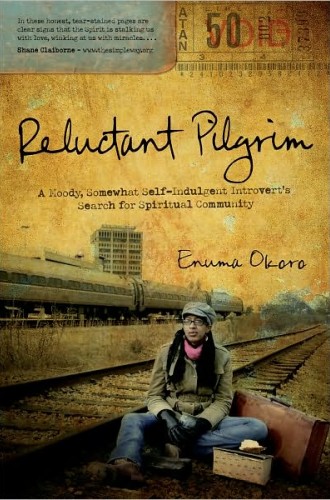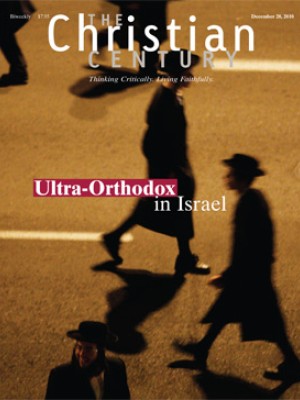A review of Reluctant Pilgrim
Does a writer's confession and confusion endear that person to you? If yes, you may be the perfect reader for Enuma Okoro's spiritual quest memoir. If not, you might want to take a pass.
Most readers will enjoy getting to know this author. Okoro was born in the United States, but she often has difficulty describing where she is from. Raised in Nigeria, Ivory Coast and England, she holds an M.Div. from Duke Divinity School, where she served as director for the Center for Theological Writing before becoming a writer and speaker full-time.
The audience Okoro seems to be speaking to is youthful, questing and deeply ambivalent about church. The enticing picture on the cover shows her seated beside railroad tracks wearing jeans and boots. Have pen, will travel.
The title Reluctant Pilgrim suggests an affinity with the classic spiritual quest books—Bunyan's Pilgrim's Progress, Augustine's Confessions—and with more contemporary accounts like Lauren Winner's Girl Meets God and Anne Lamott's gritty, humorous memoirs. The publisher's blurb invites us to consider Reluctant Pilgrim in this company.
Read our latest issue or browse back issues.
One reviewer compares Okoro to Elizabeth Gilbert, the best-selling author of Eat, Pray, Love. This comparison is more apt, though Gilbert is the more polished writer. The search for God and the search for a man can entertain many readers and edify some of them. The quest may also seem narcissistic to other readers, especially when they encounter sentences like these:
I'm still in shock that I'm actually admitting this, confessing that being a part of the church has been a real struggle for me. My self-proclaimed reputation as a spiritual guru, a 21st-century mystic, a divine-like being with an amazing sense of style who seemingly chose God over the Parisian runway is on the line.
Still, Okoro has some admirable instincts. She resists what Nigerian-American author Chimamanda Ngozi Adichie calls "the single story" and what Holden Caulfield, in The Catcher in the Rye, calls "all that David Copperfield kind of crap." In the first section of the book she satirizes two familiar stories—the victim story and the wisdom story. Here are her witty descriptions of two stories she will not tell about herself:
I don't have a tragic story to tell you about how the church wounded me in my childhood and then twenty years later I stumbled into a chapel hidden in a New York alley because the choir was signing a hymn that made me think of my dead mother baking biscuits after service when I was growing up in a trailer park on the edge of town before I ran away after the organist touched me inappropriately. . . .
So clearly if I write anything about my spiritual journey, it's not going to be about how I grew into this wise, self-sacrificing woman of God. (Though if that's what you come away with, fine.)
Clear about what she does not want, Okoro goes on to describe her aim, which relates to the "reluctant" in her book's title and the "moody, somewhat self-indulgent" in the subtitle:
My spiritual journey is going to be about how faith can be scarring and yet beautiful all at once. It's going to be about me finding bits and pieces of God's grace the more I realized just how unlike Jesus I actually am. It's going to be about my rocky on-again, mostly off-again love affair with the idea of church, and the painful process of learning that community and church are not always synonymous.
Her description of her goal continues for another quarter page and ends with this: "I'll pray that by the end of this story you are not praying for my salvation while waiting in line for your money back. So, that being said, here goes."
Okoro wants to be, and is, an original. Okoro also knows a profound truth: "I am a character in a story I did not write, and there are many other characters in addition to myself who are equally important." Her quest for originality leads her to fascination with herself, which is where all our stories begin. But she knows that the Christian story is about self-giving, and, like the rest of us, she finds that hard to do. But so have all the saints. All of them have been reluctant pilgrims.
In her eagerness not to tell "the single story," Okoro sometimes falls into the trap of telling too many stories and telling them all at once. The narrative arc of this memoir flatlines as a result. Though she finds community by the end of the book in a Methodist church led by a young minister, she hastens to reassure the reader that "church hasn't baked life into an apple pie" and that she still has not found the "godly man with great hair" she longs for—as though these dramatic examples would be the only evidences of transformation the reader would accept. Okoro is at her best when she tells small stories, such as her account of the birthday brunch she shares with other young women of the church: how they confide their hopes and dreams and help each other grieve, stretch, accept and grow—how deep prayers from the heart bind them together.
Memoir moves readers most when writers discover who they are in the process of writing. The shape of their stories follows a familiar arc, but the telling is one of a kind: "There are only two or three human stories," Willa Cather says in O Pioneers, "and they go on repeating themselves as fiercely as if they had never happened before."
Okoro has many literary gifts—humor, passion, honesty, a knack for vivid description. At 36, she is about at the age Thomas Merton wrote The Seven Storey Mountain and Barack Obama penned Dreams from My Father. This memoir should launch Okoro's career as a writer, but her best confessions lie before her.







